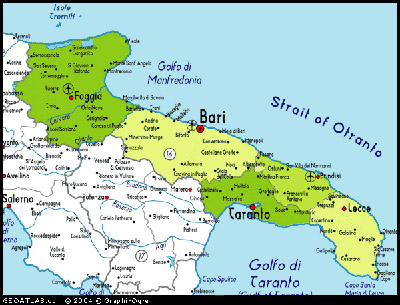Apulia is the anglicised name for Puglia, a region of Italy which occupies the heel of the boot in south Eastern Italy. Provinces include Foggia, around which the flat plains are known for the production of wheat, Bari, Brindisi, Ionio and Lecce. Another major town is Taranto. It is a wine producing area, the produce of which is generally used for blending as the quality is not high. The region has an ideal climate for growing peppers, olives, tomatoes and fennel, which appear in much of the cuisine, and, of course, with 440 miles of coastline, seafood plays a major part.
Dishes from the area include gniumereddi, ‘ncapriata and ciceri e tria, while cheeses are well represented with Provolone, Scamorza and Caciocavallo among them. Pastas include orecchiette and cavatelli.Puglia is renowned for its odd buildings, the trulli. In ancient Greek, troullos meant cupola. In Puglia, the model followed in the construction of a false dome, in which a space is covered with stones laid in regular courses but with each layer stepped inward until the stones of the final course meet at the top of the dome. It is the same technique that was used in the tholos tombs discovered in the plain of Mycenae, although the Greek examples are of more refined construction. The trulli can also be linked architecturally with numerous prehistoric monuments, known as specchie (mirrors), found in the Salento area. In addition, there are some experts who argue that the unusual architectural form is related to structures erected by Basilian monks, of Greek origin, in the valley of the Itria during the Middle Ages.
